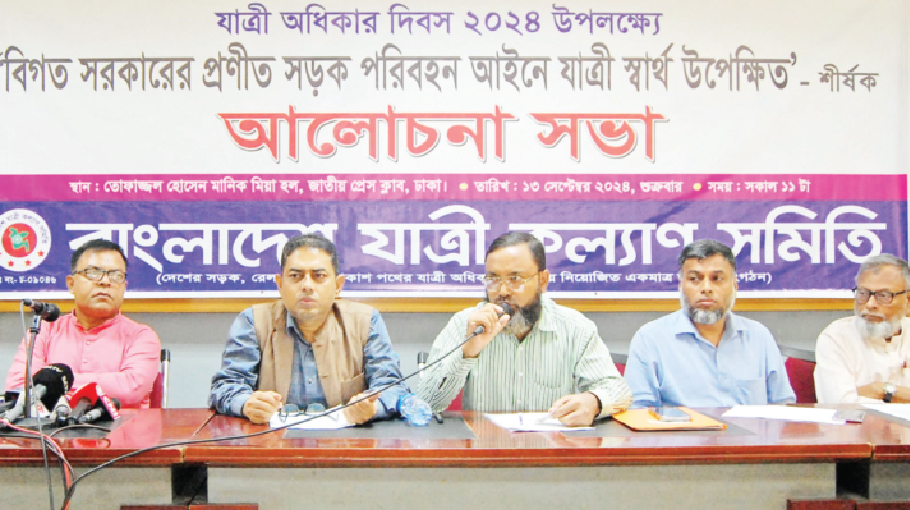Passenger rights ignored in road transport law


Bangladesh Jatri Kalyan Samity observed symbolic ‘Passenger Rights Day’ on Friday (September 13) for the fifth year protesting passenger harassment, fare hike, anarchy in the transport section and road crashes.
On the occasion, the Jatri Kalyan Samity arranged a discussion at the National Press Club in the capital. Speakers of the event said that the ‘Road Transport Act, 2018’ only serves the interest of transport workers and labourers, not of the general public and passengers.
The organsation observed symbolic passenger rights day in 2019 with a view to stopping mismanagement in the country’s transportation sector.
The Jatri Kalyan Samity believes that the law does not differ significantly from its predecessor. “Therefore, on this year’s Passenger Rights Day, we should emphasise the demand for passenger rights within the Road Transport Act, 2018,” said Md Mozammel Haque Chowdhury, secretary general of Bangladesh Jatri Kalyan Samity.
He said that due to the government's involvement in the ownership and operation of transportation, the transportation sector in Bangladesh is plagued by irregularities, lawlessness, unreasonable fares, and passenger distress. Since passengers usually lack a means of direct communication with the government, they often become victims of various forms of exploitation, leaving millions of ordinary commuters helpless. Essentially, the collaboration between the government, transport owners, and transport workers has left the country's passengers vulnerable.
Despite the government's efforts, there is a widespread lack of discipline and lawlessness in our transport sector. Concerned citizens' groups, after demanding changes in the sector for many years, finally united to rally for safer roads after one tragic accident on July 29, 2018, when two students of Shaheed Ramiz Uddin Cantonment College were killed by a bus in the capital's Kurmitola area. Subsequently, and hurriedly, the government passed a new law. However, nearly five years after its introduction, the Road Transport Act, 2018 has largely failed to address the concerns of ordinary commuters.
Though geographically minuscule, Bangladesh is home to a population of over 180 million people and is developing rapidly. Despite substantial investment in transport infrastructure, the government has struggled to create a reliable public transport system, particularly in Dhaka. Over the past few decades, public transportation has lagged behind, resulting in uncomfortable, overcrowded buses and an unreliable system. While the rest of the world has advanced in terms of communication, culture, business, and social development, Bangladesh's public transportation system remains subpar. Even as our road and transport infrastructure have developed for the better over the past decade or so, we have also seen a dire lack of safety and regulations on our roads.



